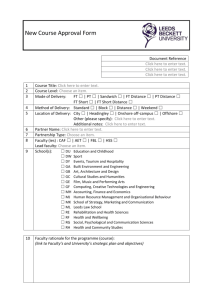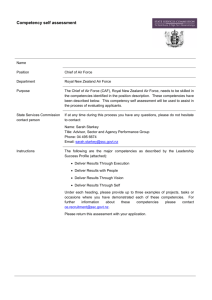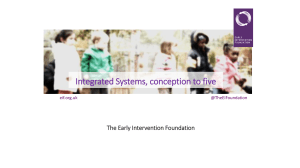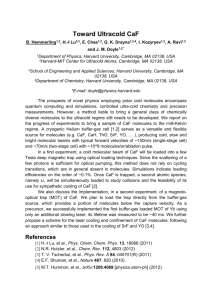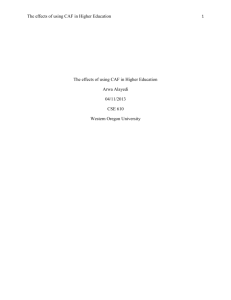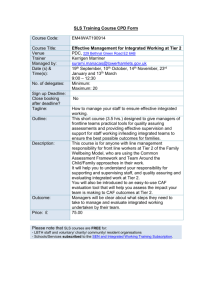Submission to the Committee on Economic, Social and Cultural
advertisement
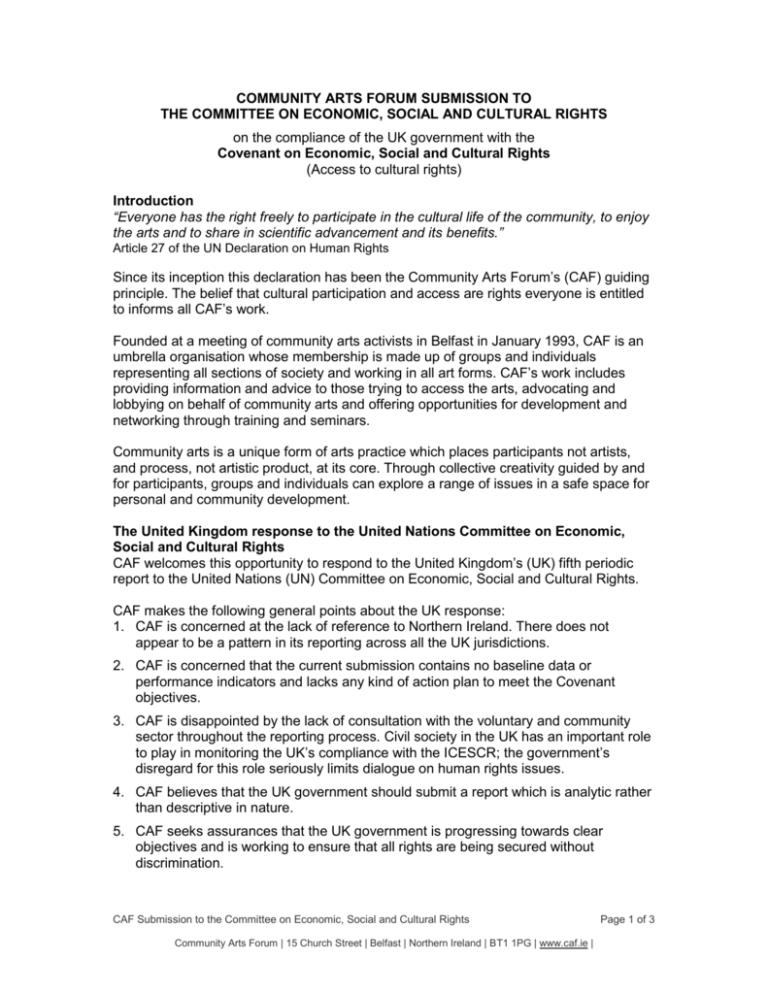
COMMUNITY ARTS FORUM SUBMISSION TO THE COMMITTEE ON ECONOMIC, SOCIAL AND CULTURAL RIGHTS on the compliance of the UK government with the Covenant on Economic, Social and Cultural Rights (Access to cultural rights) Introduction “Everyone has the right freely to participate in the cultural life of the community, to enjoy the arts and to share in scientific advancement and its benefits.” Article 27 of the UN Declaration on Human Rights Since its inception this declaration has been the Community Arts Forum’s (CAF) guiding principle. The belief that cultural participation and access are rights everyone is entitled to informs all CAF’s work. Founded at a meeting of community arts activists in Belfast in January 1993, CAF is an umbrella organisation whose membership is made up of groups and individuals representing all sections of society and working in all art forms. CAF’s work includes providing information and advice to those trying to access the arts, advocating and lobbying on behalf of community arts and offering opportunities for development and networking through training and seminars. Community arts is a unique form of arts practice which places participants not artists, and process, not artistic product, at its core. Through collective creativity guided by and for participants, groups and individuals can explore a range of issues in a safe space for personal and community development. The United Kingdom response to the United Nations Committee on Economic, Social and Cultural Rights CAF welcomes this opportunity to respond to the United Kingdom’s (UK) fifth periodic report to the United Nations (UN) Committee on Economic, Social and Cultural Rights. CAF makes the following general points about the UK response: 1. CAF is concerned at the lack of reference to Northern Ireland. There does not appear to be a pattern in its reporting across all the UK jurisdictions. 2. CAF is concerned that the current submission contains no baseline data or performance indicators and lacks any kind of action plan to meet the Covenant objectives. 3. CAF is disappointed by the lack of consultation with the voluntary and community sector throughout the reporting process. Civil society in the UK has an important role to play in monitoring the UK’s compliance with the ICESCR; the government’s disregard for this role seriously limits dialogue on human rights issues. 4. CAF believes that the UK government should submit a report which is analytic rather than descriptive in nature. 5. CAF seeks assurances that the UK government is progressing towards clear objectives and is working to ensure that all rights are being secured without discrimination. CAF Submission to the Committee on Economic, Social and Cultural Rights Community Arts Forum | 15 Church Street | Belfast | Northern Ireland | BT1 1PG | www.caf.ie | Page 1 of 3 The necessity of cultural rights Cultural access is an extremely important and defensible human right. Culture in its broadest sense is at the core of communities and crucial to the formation of individual and group identities. Cultural expression, through a range of art forms including dance, drama, music and visual arts allows individuals and groups to self-define, express and explore who they are. The need for an identity and the ability to express it are among the most basic human and psychological needs. Meaningful opportunities for people to participate in the cultural life of their communities have the potential for numerous socio-economic and personal benefits for those involved. These include: Group and social cohesion; Improved self esteem (one study produced in 1998 reported that 93% of participants in community arts programmes had improved self confidence1 Pathways to education and employment Improved recovery times for hospital patients2 Opportunities for conflict resolution These are just some of the many ways arts participation can impact positively on individuals and their communities. In investment terms, community arts offers outstanding value for money. Its participant led approach delivers local capacity building and addresses interdepartmental government objectives. Despite this, communities desperate to develop arts projects can find it difficult to access necessary support in the face of lack of understanding about the benefits of arts. Instigating community arts projects and allowing people access to their cultural rights regardless of their ability to pay is, like other community development work, heavily reliant on funding. The overall per capita spend on the arts in Northern Ireland is the lowest in the UK and the Republic of Ireland.3 This low spend represents a lack of parity of esteem and results in a situation where, at all points of entry, access to the arts and 11 Vital Signs: Mapping Community Arts in Belfast by François Matarasso (with Chell, John). Published by Comedia, 1998. 2 Arts and Health: A Community Development and Action Research Project. By Dr Katrina Collins, published by the Community Health Development Network, 2007. Available for download from www.cdhn.org 3 The per capita spends for 2008/09 are £7.58 in Northern Ireland; €19.78 in the Republic of Ireland; £10.10 in Wales; and £8.47 in England. (The figures for Scotland are not directly comparable). CAF Submission to the Committee on Economic, Social and Cultural Rights Community Arts Forum | 15 Church Street | Belfast | Northern Ireland | BT1 1PG | www.caf.ie | Page 2 of 3 therefore cultural participation is severely limited. The impact of this continued under funding is huge, resulting in an unstable sector in which new projects find it difficult to gain footing and existing ones must fight for survival. Thanks in part to the sustained lobbying of community arts activists, the principal funder for arts in the region The Arts Council of Northern Ireland (ACNI), has made inroads into addressing the unique support needs of community driven arts practice. Despite this, 91% of annual revenue funding goes to non community driven arts practice which is an extremely unequal distribution of resources.4 This submission is written against the backdrop of deepening global economic decline and locally, a review of arts funding by the Northern Ireland Assembly. Despite having a clear focus on arts in community contexts and opportunities for participation at local level, the review raises serious concerns that government is seeking to make cuts to an already beleaguered sector. Robust lobbying tools are needed to convince and compel governments to recognise cultural rights and access, this will help to secure sustained financial backing. The current review of the International Covenant of Economic, Social and Cultural Rights presents a key opportunity to broaden the current definition of cultural rights within the UK response. Recommendations 1. The current list of issues for consideration by the UK government refers only to language rights which although vital, represent only one aspect of the spectrum of cultural needs. CAF urges the committee to include a broad definition of cultural rights and to place this on the human rights agenda at local, national and international levels. A more inclusive definition of cultural rights in the covenant will give lobbyists a point of reference for future campaigning and a firm basis to push for genuine equality of opportunity for arts participation for all. 2. CAF requests that the UK government outlines what steps it will take to measure progressive realisation of cultural rights 3. CAF requests that the UK government gives a clear timeline specifying when it expects to meet its obligations under the Covenant. 4. CAF recommends that the UK government clarifies which part of the report relates to which jurisdiction within the UK and, in particular, draws attention to where the law in Northern Ireland differs to other parts of the UK. 4 During the 2008-09 financial year, community arts received £841,664 from the ACNI total revenue budget of £9,625,035 CAF Submission to the Committee on Economic, Social and Cultural Rights Community Arts Forum | 15 Church Street | Belfast | Northern Ireland | BT1 1PG | www.caf.ie | Page 3 of 3
